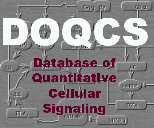
|
Enter a Search String | | Special character and space not allowed in the query term.
Search string should be at least 2 characters long. |
Molecule Parameter List for CaM-Ca4 | The statistics table lists the distribution of a molecule acting either as a substrate, product, enzyme or as a molecule within the network.
The text color of a molecule is highlighted by  color. color. | | Statistics |
| CaM-Ca4 participated as | Molecule | Sum total of | Enzyme | Substrate of an enzyme | Product of an enzyme | Substrate in Reaction | Product in Reaction | | No. of occurrences | 1 | 0 | 0 | 0 | 0 | 1 | 0 |
Accession and Pathway Details | |
| Accession Name | Accession No. | Accession Type | Pathway Link | NOS_Phosph_
regulation | 20 | Pathway |
NOS | | This model features the phosphorylation of rat brain neuronal NOS expressed in E. coli or Sf9 cells, which leads to a decrease in Vmax of the phosphorylated enzyme, with little change of both the Km for L-arginine and Kact for CaM. This is based on Hayashi Y. et al. J Biol Chem. (1999) 274(29):20597-602. They report of phosphorylatin being carried out by CaM kinases I alpha, II alpha and IV. The rates used have been obtained from their paper and from other reported experimental data. |
CaM-Ca4 acting as a Molecule in NOS_Phosph_regulation Network
| Name | Accession Name | Pathway Name | Initial Conc.
(uM) | Volume
(fL) | Buffered | | CaM-Ca4 | NOS_Phosph_
regulation
Accession No. : 20 | NOS
Pathway No. : 90 | 20 | 0.0016667 | Yes | | |
CaM-Ca4 acting as a Substrate in a reaction in NOS_Phosph_regulation Network
| Kd is calculated only for second order reactions, like nA+nB <->nC or nA<->nC+nD, where n is number and A,B,C,D are molecules, where as for first order reactions Keq is calculated.
Kd for higher order reaction are not consider. |
| Name | Accession Name | Pathway Name | Kf | Kb | Kd | tau | Reagents | | Ca-CaMbind_nNOS | NOS_Phosph_
regulation
Accession No. : 20 | NOS
Pathway No. : 90 | 3.25
(uM^-1 s^-1) | 0.05
(s^-1) | Kd(bf) = 0.0154(uM) | - | Substrate
CaM-Ca4
nNOS
Product
Ca-CaMnNOS
| | Those binding CaM have a high Kd, including nNOS, ~<=10nM. The binding of CaM to nNOS has been demonstrated to act as the trigger necessary for electron transfer and catalytic activity. (Marletta, Biochemistry, 1997;36:12337-12345). |
| Database compilation and code copyright (C) 2022, Upinder S. Bhalla and NCBS/TIFR
This Copyright is applied to ensure that the contents of this database remain freely available. Please see FAQ for details. |
|
